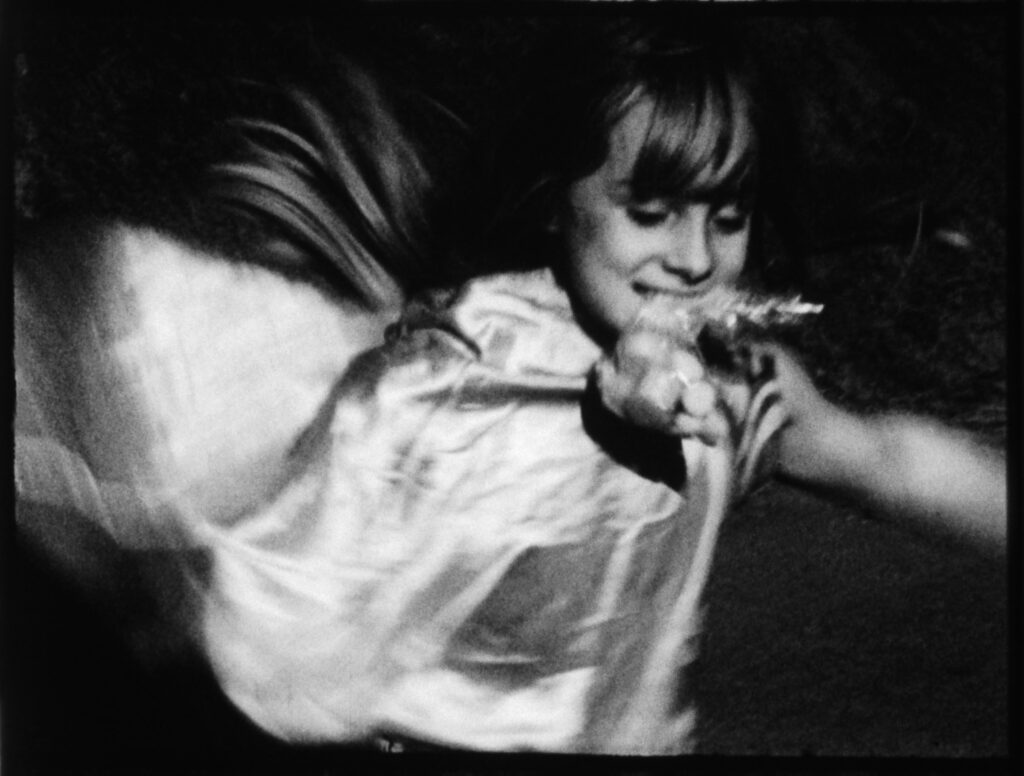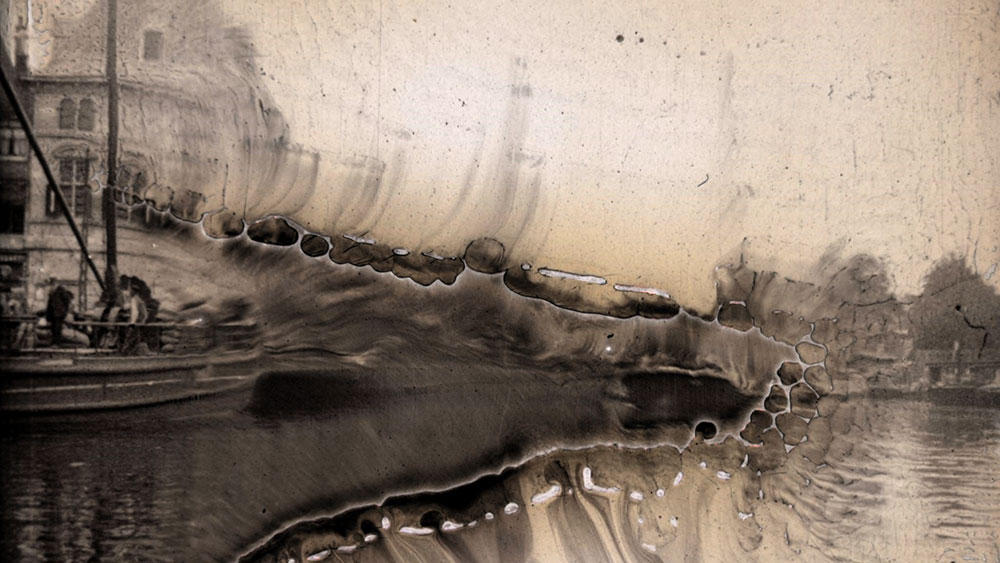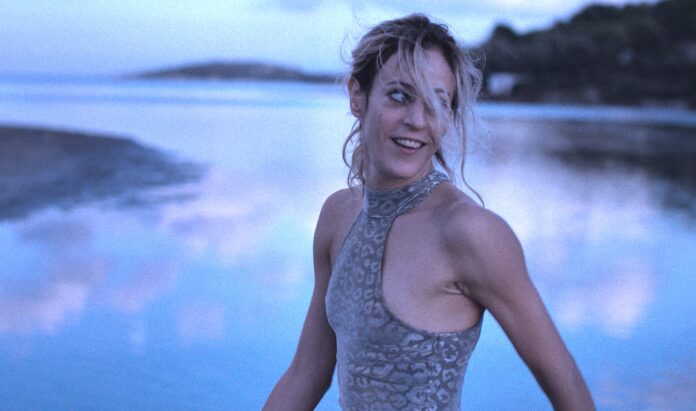Feel like fleeing the country? You are not alone. Vicarious flight, at least, can be pretty easily managed with the return this weekend of the San Francisco Greek Film Festival. Its 22nd edition takes place both in-person at the Delaney Screening Room Sat/15 through Sat/22, and via online access March 15-April 5. The eight live programs (nearly all starting at 7 pm, save opening/closing nights at 6) each include a feature and one or two shorts.
The kickoff attraction is US comedy Greek Mothers Never Die, whose heroine Ella (Abby Miner) has been strangled by mom Despina’s (writer-director Rachel Suissa) “overbearing love” from the cradle. When ma kicks the bucket, that ought to be the end of it—yet her ghost proves just as meddlesome in her daughter’s affairs. In a similar vein, Vasilis Christopfilakis wrote, directed, and stars in Guest Star (Thurs/20) as a nebbishy recluse overshadowed by his glam movie-star parents even years after their deaths. He’s offered an improbable chance at hosting a late-night TV show. But that requires a considerable image makeover—including, for publicity’s sake, a pretend “romance” with a pop star (Elli Tringou) whose own psychological issues make his look like child’s play.
The bulk of this year’s main Greek Fest selections are more serious in tenor. Yorgos Zois’ Arcadia (Sun/16) is a somber drama about a couple called to a remote region to identify a body, only to find themselves caught in a larger sort of metaphysical limbo between the living and the dead. Jason Raftopoulos’ Voices in Deep (Mon/17) involves characters in very up-to-the-moment crises involving refugees, economic hardship and illegal trades. Sofia Exarchou’s Animal (Tues/18) stars Dimitra Vlagopoulou as a worker at an island resort where she and others are expected to present an image of hedonistic abandon for foreign tourists. But the rave-like atmosphere conceals a depressing reality for employees who are not remotely “on vacation.” Likewise, “paradise” isn’t all it’s supposed to be for the young heroine spending a summer on the Athenian Riviera in Orfeas Peretzis’ film (Wed/19).
Grimmer still is Dimitris Nakos’ Meat (Fri/21), which recalls ancient Greek tragedies in its tale of violence and vengeance within a family operating a rural butcher shop. There’s also considerable suspense in the intrigue of Penny Panayotopoulou’s feature Wishbone (Sat/22), where a young man forced to take on the burden of his family’s welfare after a brother’s death takes a job as security guard at a hospital. But there is dangerous criminality there, too, and he risks losing everything by becoming involved in its not-so-easy money.
All the above are narrative titles, and will also be available for streaming. Available online-only are a number of documentary features and shorts, including portraits of celebrated composer Yani Spanos (A Life Behind the Marquee) and Anthea Sylbert (My Life in 3 Days), the latter an Oscar-nominated producer and costume designer whose credits included Rosemary’s Baby, Carnal Knowledge, Chinatown and Shampoo. There are also nonfiction flicks about cave diving (4Caves—4Seasons), a massive emigration of Greek laborers to Germany in the early 1960s (A Couple of Years), the case of three Afghan women murdered in Greece (Evros: A Blurred landscape), the historic mountain village of Kalarrites (Bimsa), and more.
The official closing-night screening of Wishbone will be preceded by presentation of the Spyros P. Skouras Lifetime Achievement Award to longtime studio executive and producer Sid Ganis. His career at Lucasfilm, Paramount, Marvel Entertainment and elsewhere has encompassed involvement with The Empire Strikes Back, Raiders of the Lost Ark, Top Gun, Fatal Attraction, Forrest Gump, Iron Man, and even an Adam Sandler vehicle or two. For full info on the 22nd SF Greek Film Festival, running March 15-22 (and until April 5 online), go here.
Casting a broader net untied to any particular culture or country is the latest edition of Cinequest Film & Creativity Festival, the South Bay’s premiere such event since 1990. It opens this Tues/11 with The Luckiest Man in America, a fact-based tale of a guy who managed to game the TV game shows, and closes Sun/23 with Naomi Watts and Bill Murray in seriocomedy The Friend, an adaptation of Sigrid Nunez’s National Book Award winning novel.
In between, there will be plenty of the usual world-premiere indie features, some recent festival-circuit favorites from around the world, a special presentation of the original silent Nosferatu, genre spotlights, shorts programs, panels, emerging-technology forums, and more at venues in San Jose and Redwood City. For full schedule and ticket info, go here.

But you don’t have to go to a festival for a filmmaker tribute this week, as there are several notable stand-alone events in that mode. San Francisco Cinematheque is offering two of them. First, at The Lab on Thu/13, there’s “Trace Elements: Remembering Gunvor Nelson.” That Swedish experimentalist—who passed away this January at age 93—will be represented by a program spanning four decades, which was also roughly the amount of time she spent living in the Bay Area. The earliest to be shown is the astonishing 1966 Schmeerguntz (co-directed with Dorothy Wiley), a ruthless, humorously grotesque dissection of women’s societal roles as defined by advertising vs. private images. The latest title is Tree-Line, her first video work from 1998. These densely layered works reward multiple viewings.

The next night at Shapeshifters in Oakland, there’s “Ruins & Resilience: Films by Karel Doing.” Visiting in conjunction with his book of the same name, the English artist and researcher will also lead a workshop at the same location on “Phytography: Eco-Friendly Filmmaking With Plants,” the technique he’s invented combining plants and photochemical emulsion.
This Wed/12 will bring to SF’s 4-Star Theater Robert Townsend (more info here), the actor and comedian who made a splash with 1987’s industry satire Hollywood Shuffle, which he directed and co-wrote, roles he later played on several subsequent features. But before that, he was primarily in front of the camera, perhaps most notably in 1984’s A Soldier’s Story, which will be shown tonight.
Norman Jewison’s film of Charles Fuller’s Pulitzer-winning play was a sleeper hit that won three Oscar nominations, including Best Picture, and Best Supporting Actor for Adolph Ceasar. The latter repeated his stage role as Master Sergeant Waters, arguably the most despicable screen illustration of sadistic racial self-loathing this side of Samuel L. Jackson’s character in Django Unchained. T
he man in charge of an all-Black Army unit in 1944 Louisiana, his unsolved murder draws the investigative presence of a Black commissioned officer (Howard E. Rollins, Jr.) from Washington DC, which further roils waters on a segregated wartime base. This punchy drama gave a career boost to a lot of fine young actors—particularly Denzel Washington as a subordinate recruit who had already declined to put up with Waters’ abuse. Townsend’s appearance coincides with his performing the one-man show Living the Shuffle at The Marsh in Berkeley.
Fascinatin’ fascism, our shrinking free press, more about Palestine: Three documentaries
Though you may feel you’ve already had your fill of bad news, it always pays to be better informed when digesting it. Three recent documentaries will do that and then some.
Connie Field’s Democracy Noir, which opens at the Roxie on Wed/12, provides an overview of the insidious way that democracy has been steadily eroded in Hungary over recent years. Tactics have included gerrymandering, changing election laws, demonizing of minorities, assault on the national constitution, stacking the courts, building a border wall, encouraging “patriotic” childbearing, redirection of funds intended for healthcare, government control of media, laws reducing worker rights, picking fights with the EU, populist rhetoric based on disinformation, fear and xenophobia…sound familiar? Yup, we’re only a step or two behind Hungary now.
One of the most important recent U.S. non-fiction features was Stripped for Parts: American Journalism on the Brink, which should have been much more widely seen. You’ll get your chance when Rick Goldsmith’s film plays Thurs/13 at the Roxie and Berkeley Hillside Club, plus March 20 at the Rafael Film Center. It shows how U.S. newspapers and other local outlets have been decimated not just by the internet destroying their business model, but by a more insidious foe.
That would be the multinational hedge funds and private equity firms, often operating under a cloak of secrecy (and “based” in notorious offshore tax shelters). that practice “vulture capitalism” in buying journalistic enterprises with the intent to liquidate them. As one observers here puts it,“They saddle the business with debt, they fire reporters, then they strip [it] for their parts,” notably salable real estate. This creates regional “news deserts” whose uninformed populace are less likely to vote, let alone protest corrupt policies that likewise exclusively benefit the corporate rich. It’s one more way in which the robber barons seem to be winning.
While both those films have previously played a Bay Area date or two, Stephen Apkon’s There Is Another Way arrives as a brand-new release. It gives a brisk big-picture glimpse at the history of Israel’s occupation of Palestinian lands, as well as the drastic escalation in hostilities that commenced after Hamas’ terrorist attacks on the Nova Music festival and Kibbutz Be’eri. (Which, it is duly noted, have resulted in casualties numbering about twenty-five times higher for Palestinians than for Israelis, not to mention the two million-plus displaced from their homes.)
There is some hard-to-watch footage of brutality on both sides. But the primary emphasis here is on Combatants for Peace, a bi-national, non-violent grassroots group of both Arabs and Jews seeking the peaceful solution that once seemed within reach—and now appears not even to be a consideration amongst most political players. Executive produced by James Cameron, the documentary plays this Thurs/13 at the Rafael and opens Fri/14 at the Roxie. The director and some onscreen subjects will be present for Q&A’s at select screenings.
Escapism roundup: Dystopian futures, vintage Czech fantasy-comedy
If you need a breather after all that harsh political reality—and who doesn’t?—there are some fun fantasy escapes on tap at present. Two are already playing in theaters: There’s Mickey 17, the second English-language feature from Bong Joon-ho of Parasite and The Host. Its gist is not unlike his first one, Snowpiercer, in that this is a dystopian-future vision in which the proletariat eventually rises up against a cartoonishly exploitative aristocracy (here played by Mark Ruffalo and Toni Collette). But this adaptation of an Edward Ashton novel is very different otherwise, with Robert Pattinson endearing as an “expendable”—a worker whose status is so low, he’s routinely assigned lethal tasks, then simply reproduced in a 3D “human printer.” Set during a long space voyage, then on a distant colonized planet, it’s a long (137 minutes) but clever, twisty and engaging tale with its own pointed if easy-to-take political messaging.
Also playing theaters nationwide is In the Lost Lands, the latest collaboration between director Paul W.S. Anderson and wife-star Milla Jovovich, who are best known for all those Resident Evil movies. This adaptation of a story by Game of Thrones author George R.R. Martin is in the same general vein of horror-adjacent fantasy action, heavy on CGI effects and outlandish gravity-defying fight scenes. Co-starring Dave Bautista as a gruff adventurer hired to take “good witch” Jovovich into dangerous terrain in a bleak far-distant future, this is not a movie anyone is going to call clever or twisty. Originality is scarce here, credibility extinct. But Anderson really knows how to keep the guilty pleasures going—Lost Lands looks great, moves at a clip, and never takes itself too seriously. There have been a lot of bigger, more pretentious fantasy flicks of late that were less fun than this one.
Going from the mainstream to the decidedly obscure, cineaste streaming platform OVID has dug up a small treasure in Oldrich Lipsky’s 1978 Adela Has Not Had Supper Yet, which parodies silent serials, old pulp detective fictions, Jules Verne-type fantasy, and whatever else comes to mind. Michal Docolomansky plays Nick Carter, “world’s greatest detective,” a master of disguise and deployer of absurd technological gizmos. (This same-named character actually was very popular for over a century starting in 1886, his adventures written by many authors and played out in many nations’ media, from magazine stories, novels and comic books to radio shows and movies.) He accepts an offer to leave 1900 NYC and investigate a case in Prague. Upon his arrival, assassins lurk around every corner, while mad scientists and fair maidens compete for his attention; there’s also a giant carnivorous plant right out of The Little Shop of Horrors. It’s a lively farce spoofing all kinds of genre tropes, goofy yet stylish, that becomes available on OVID as of Tues/18.




